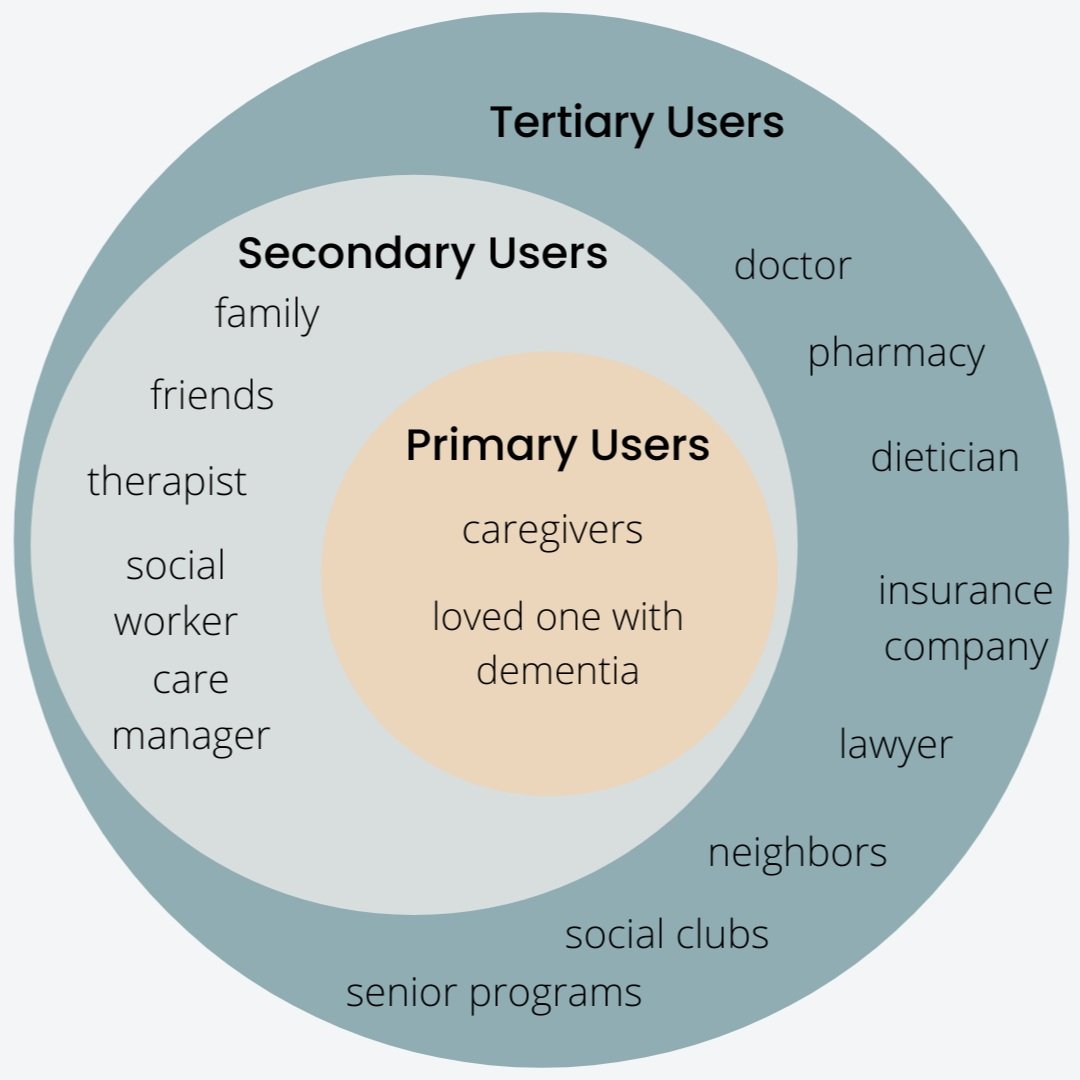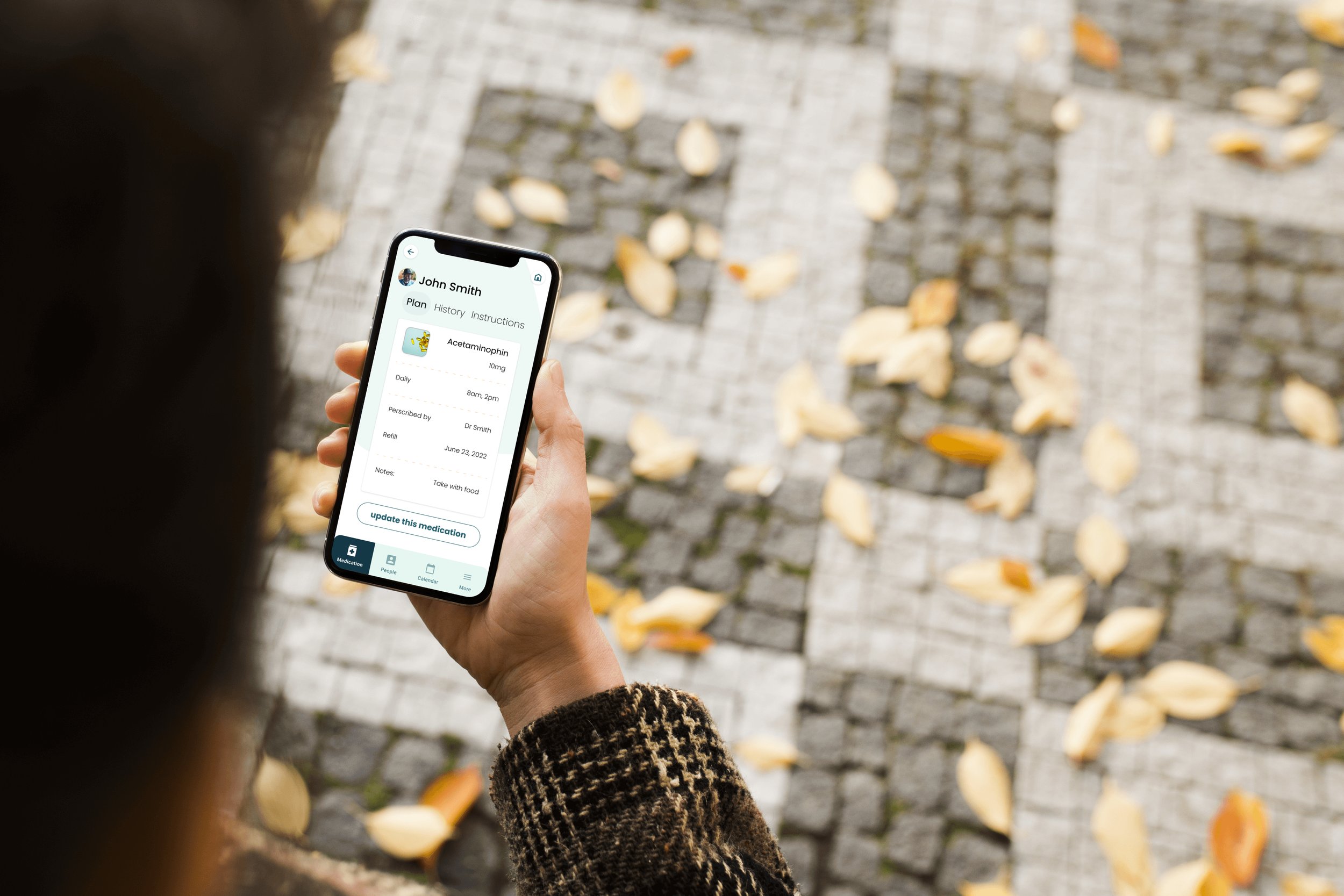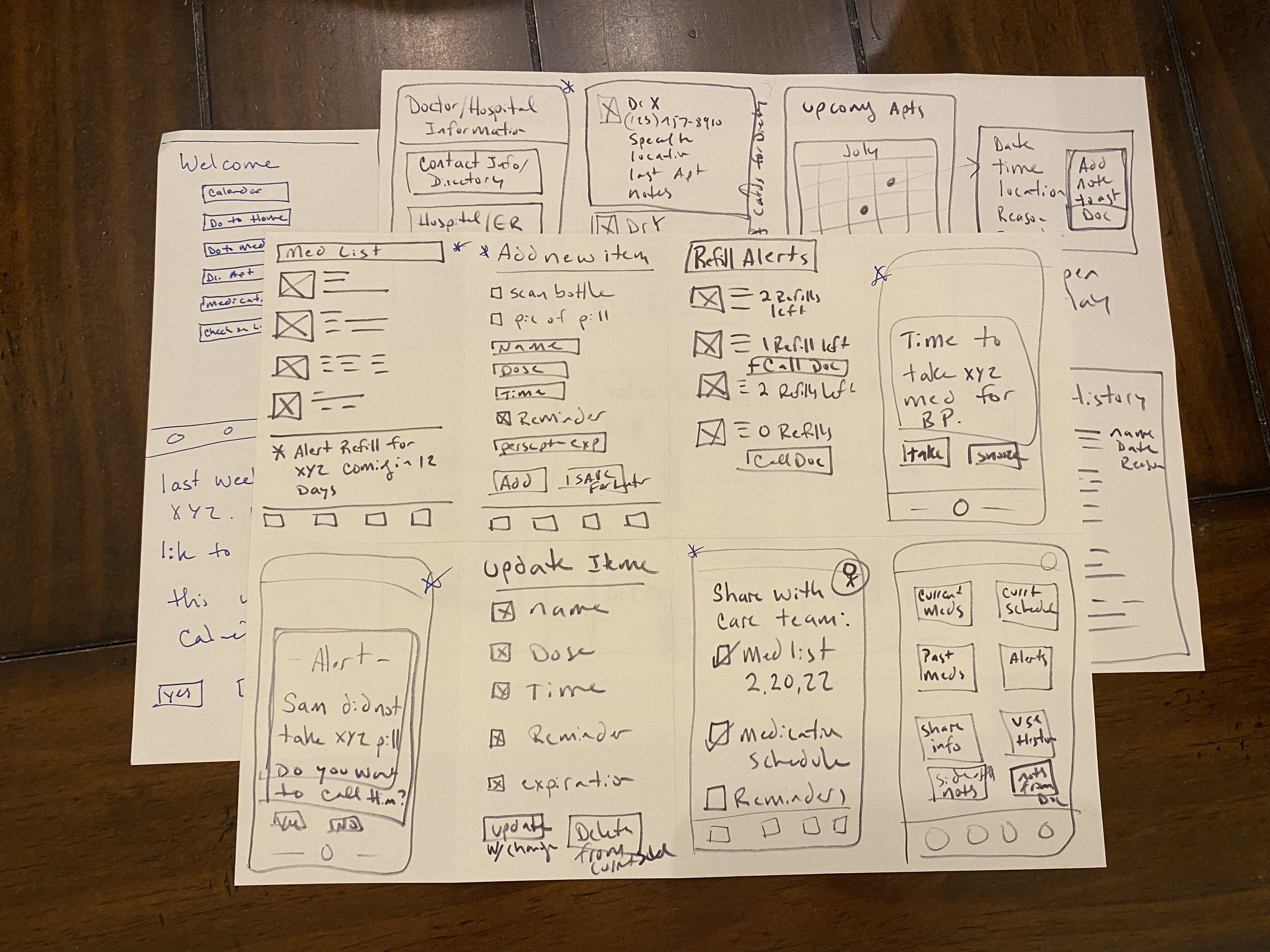Memento
a place where all the information a caregiver needs to collect is integrated and accessible in one spot
goal: identify what parts of caregivers schedules seem manageable and what activities feel chaotic and design tools to simplify tasks.
role: UX Researcher & Designer
tools: miro, figma, maze, user interviews, surveys, usability tests
time: 3 months
Context
$277 billion dollars in untapped potential
In the US, annual costs for care are estimated at $277 billon per year - $186 billion to Medicaid & Medicare and $60 billion out of pocket.
The cost of caring for a person with dementia is not only high financially, but it also takes a great deal of time
$21 billion dollars wasted on preventable errors
The National Institute of Health estimates that preventable medication errors cost 21 billion dollars annually and that at least 7 million patients are affected by these errors.
Family caregivers and medical professionals are busy. Getting caught up in redundant tasks can lead to poorer patient care, less time and respite for loved ones, and wasted resources in the healthcare system.
Problem
Family caregivers and medical professionals are busy.
Getting tied up with with redundant tasks can lead to worse care for the patient, less time and respite for loved ones, and wasted time and money in the healthcare system
Caregivers want to accomplish tasks effectively and efficiently, but are often hindered by lack of access to doctors and clear information
Gap
There are currently no dedicated tools for coordinating caregivers and the person with dementia
Solution
Memento
a place where all the information a caregiver needs to collect is integrated and accessible in one spot
Research
I began this research with an investigation of what tools are currently on the market and who might be the primary users
What tools are available?
While there are a lot of brain game and cognitive challenge apps geared toward older adults and people with dementia, there are no competitors making products focused on schedules/reminders/doctors/meds for people with dementia and their caregivers.
What can be done to support busy caregivers?
How can we remove redundant steps?
8 interviews &
11 survey responses
I moved into exploratory research to investigate users needs and wants. I facilitated 8 interviews with individuals who were either family caregivers or professionals in the dementia field. I received 11 survey responses from family caregivers who were interested in the project but too busy to sit down for an interview.
Through this research I explored:
Tools and tech used by caregiver and the person with dementia
Ways they communicate
How they organize daily activities, special events and appointments
How they coordinate with other caregivers
How they manage medication
Analysis
Through affinity diagraming and thematic analysis, I identified key themes and salient points.
"when you’re taking care of somebody, time is the one thing you don’t have”
"I want coordinated, updated communication”
"There are a thousand things you don’t anticipate until you’re in it”
Insights
01
Caregivers want their loved ones needs met even when they are complex.
02
Caregivers often don’t know where to find resources.
03
Caregivers want simplicity, efficiency and to avoid redundant interactions.
it’s complicated, challenging and redundant to communicate with medical professionals.
Areas of concern that frequently arose in my interviews revolved around safety, efficiency and adaptability.
Caregivers spoke of the challenges they had coordinating info between doctors and pharmacists and pointed out that medication mistakes can be dangerous and even deadly!
situations can change on a dime so if the care giver does not have access to the resources and contacts they need everything will continue to get pushed back. At best this is frustrating and at the worst could be harmful
A caregiver should not have to spend two days making half a dozen phone calls, just because the pharmacist couldn’t read the doctor’s handwriting.
Pain Points
01
It is complicated to share information with doctors.
02
Situations change frequently.
03
Mistakes can be dangerous or even deadly.
What do users need?
It’s important for the caregiver to accurately manage their loved ones needs but that shouldn’t take up so much time and brain power that they are unable to focus on their own wellness
Users
ready for more support
The target users for this product are primary caregivers for people with dementia. This person is a family caregiver and is typically a spouse or adult child.
A primary concern of people who consider themselves busy is that they will miss or forget something. Even people who use a lot of tech and tools said they found themselves saving all sorts of papers from doctors/pharmacy/etc and expressed concern that they would lose important papers or miss something.
The people who see themselves as having a more complex schedule, whether or not they use tech, are the ones who are ready for more support.
Persona & User Journey Map
Kathy is 62 years old and lives in Chicago. She is a busy middle school teacher who works full time and volunteers at a local animal shelter.
She is married and her husband was recently diagnosed with Mild Cognitive Impairment and early stage Alzheimer’s disease.
While her husband is still able to administer his own medications, he and Kathy feel safer if she organizes and sets the reminders for his medications.
Kathy is busy and knows that she needs to be adaptable to meet her husband’s medical needs as they change. She is looking for tools she and her husband can use so they can feel at ease about his meds and focus on the other important things in their lives.
“Every little thing has all these steps. Maybe a week from now I’ll have it all done and it won’t seem so complex”
Family caregivers are often “on the job” 24 hours a day.
When asked, one caregiver said she doesn’t need to remember to give her husband his medication because she is just continually giving him meds.
She said this makes her feel tired, redundant, and frustrated.
How might we help caregivers save valuable time?
How might we make the stressful task of managing medications less frustrating?
Ideation
How to solve medication management process? The solution had to be simple adaptable and easy to access.
Originally I had dreamt of a complex product that would navigate many challenges caregivers experience. As I explored my data and considered the users needs I narrowed my ideas to a simple MVP of an app that can store all relevant medication data including medication lists, prescriptions, schedules.
Memento
a place where all the information a caregiver needs to collect is integrated and accessible in one spot.
The goal of MEMENTO is to allow caregivers to ORGANIZE, SAVE and SHARE the important things they need.
Caregivers will be able to add all the information they want to store in one concise spot and share the info with other caregivers or loved ones as needed .
paper wireframes
lo-fi wireframes
hi-fi wireframes
Iterations
Usability Testing
4 moderated usability tests & 12 unmoderated usability tests
Through research I found that people wanted the steps to be more clear and actionable. They did not want click through more than one page to access any task. People also overwhelmingly wanted everything on the homepage to be clickable.
Insights
01
direct and simple pathways
02
clear calls to action
03
access to everything from home page
Memento
a place where all the information a caregiver needs to collect is integrated and accessible in one spot
learnings and looking ahead
There is a lot of potential for growth and development!
The first thing I learned from this project is that the need for dementia care and support is vast. There is a nearly endless opportunity for research and design in this sector.
There is so much potential for Memento to grow and develop! I would love to see it expanded to different users and different journeys. For example, how could it be modified to be efficiently used by a person with mild dementia who does not have a caregiver? What could be added to support people with Mild Cognitive Impairment in their activities of daily living. Could Memento safely keep track of cognitive changes and or signs of burnout? How could resources such as diet and menu, leisure activities, medical resources and caregiver support groups be integrated?































